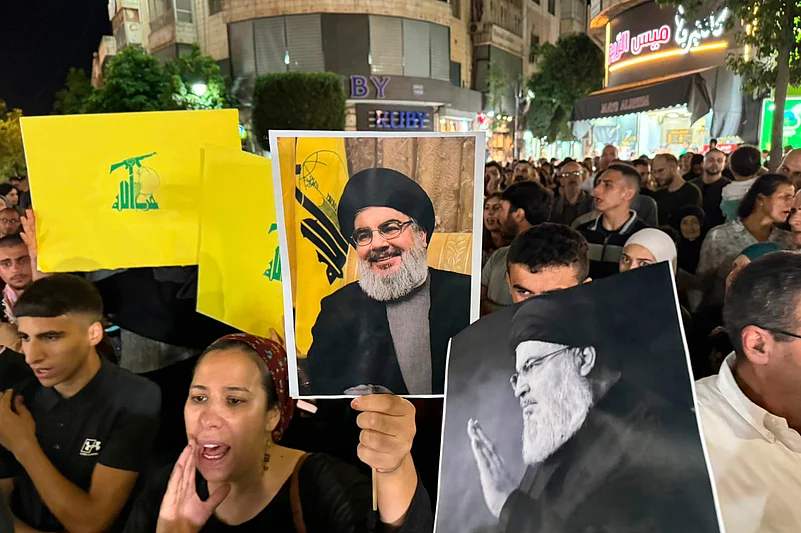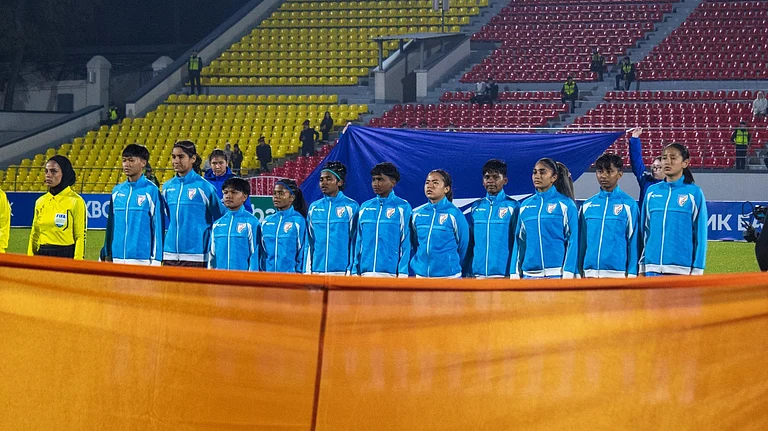Tensions in the Middle East region have gone through the roof with Israel's fierce airstrikes in Lebanon that have targetted Shia Islamist militant outfit Hezbollah and have killed nine of its high-ranking commanders and officials so far, including group's top leader Hassan Nasrallah.
Israel and Hezbollah, who have carried out repeated strikes against each other since the war on Gaza began on October 7 following Palestinian militant group Hamas's attack on Israeli territories, came the closest to an all-out war than ever before following the wave of explosions in Lebanon that hit pagers and walkie-talkies belonging to Hezbollah members September 17 and 18, killing at least 37 people - including two children - and leaving about 3,000 injured.
Since the pager and walkie-talkie explosions in Lebanon, for which Israel was blamed, multiple strikes have hit what the Israeli side has called Hezbollah targets in the country, killing and displacing hundreds so far. Vowing to retaliate, Hezbollah has also launched rockets multiple times and lost several top commanders to Israeli strikes in the past week.
9 Hezbollah Officials Killed Over Past Weeks
Hassan Nasrallah
One of the biggest blows to Hezbollah, which had opened a front to support its ally Hamas in the Gaza Strip a day after the October 7, 2023, Palestinian group's surprise attack into southern Israel, was the killing of its chief Hassan Nasrallah who had vowed to retaliate post the pager and walkie-talkie explosions in Lebanon, for which Israel was blamed but did not deny or claim the responsibility of.
Hassan Nasrallah was killed in a series of airstrikes that leveled several buildings in southern Beirut on Saturday.
In 1992, Nasrallah had led the group through several wars with Israel, and oversaw the outfit's transformation into a powerful player in Lebanon.

Hezbollah entered Lebanon's political arena while also taking part in regional conflicts that made it the most powerful paramilitary force. Hezbollah, an Iran-backed group, is considered Lebanon's most powerful armed force. After Syria's uprising in 2011 escalated into a civil war, Hezbollah played a key role in keeping Syrian President Bashar Assad in power. Under Nasrallah, Hezbollah also helped develop the capabilities of fellow Iran-backed armed groups in Iraq and Yemen, according to information in an Associated Press report.
Nasrallah is also seen as a divisive figure in Lebanon, with a section of people hailing him for ending Israel's occupation of southern Lebanon in 2000, and his opponents decrying him for the group's weapons stockpile and making unilateral decisions that they say serves an agenda for Tehran and allies.
Hashim Safieddine
Hashim Safieddine, who heads Hezbollah's central council, was in the fray to be Nasrallah's successor. Safieddine was Narallah's cousin and married to the daughter of Iranian Gen. Qassem Soleimani, who died in a US drone strike in 2020. Like Nasrallah, Safieddine joined Hezbollah early on and wears a black turban.
Suhail Hussein Husseini
The Israeli Armed Air Force (IAF) conducted a precise strike on October 7 that killed Suhail Hussein Husseini, Commander of the Hezbollah terrorist organization headquarters in Lebanon's Beirut area, the IDF announced next day. Husseini, a member of Hezbollah's Jihad Council, played a key role in weapon transfers between the outfit and Iran and was responsible for distributing the advanced weaponry among group's units, as per The Jerusalem Post.
Nabil Kaouk
Nabil Kaouk, the deputy head of Hezbollah's Central Council, was also killed in an airstrike Saturday. He joined the militant group in its early days in the 1980s and later also served as its military commander in south Lebanon from 1995 until 2010. Kaouk made several media appearances and gave speeches to supporters, including in funerals for killed Hezbollah militants. He was seen as a potential successor to Nasrallah.
Ibrahim Akil
Ibrahim Akil was a top commander and led Hezbollah's elite Radwan Forces, which Israel has been trying to push further away from its border with Lebanon. Akil was also a member of its highest military body, the Jihad Council, and had been on the United States' wanted list for years, as per the AP report.
As per the US State Department, Akil was part of the group that carried out the 1983 bombing of the US Embassy in Beirut and was played a role in taking German and American hostages.

Ahmad Wehbe
Ahmad Wehbe was a commander of the Radwan Forces and played a crucial role in developing the group since its formation. Wehbe was reportedly killed in the same airstrike in Beirut's southern suburbs in which Akil died.
Ali Karaki
Ali Karaki led Hezbollah's southern front, playing a key role in the ongoing conflict. Not much is known about Karaki, who US described as a significant figure in the militant group's leadership. Karaki was killed alongside Nasrallah in an airstrike.
Mohammad Surour
Mohammad Surour was the chief of Hezbollah's drone unit, which was used for the first time in this current conflict with Israel. Under him, Hezbollah launched exploding and reconnaissance drones deep into Israel, penetrating its defence systems which had mostly focused on the group's rockets and missiles.
Ibrahim Kobeissi
Ibrahim Kobeissi, who was the head of Hezbollah's missile unit, had planned the kidnapping and murder of three Israeli soldiers at the northern border in 2000, as per the Israeli military. The bodies of the three Israeli soldiers were returned in a prisoner swap with Hezbollah four years later.
Other Hezbollah Commanders Killed
Tensions between Israel and Hezbollah had been escalating in the months before the recent escalation after Israel's military had targeted top commanders, most notably Fuad Shukur in late July, hours before an explosion in Iran widely blamed on Israel killed the leader of the Palestinian Hamas militant group Ismail Haniyeh.
Fuad Shukur was accused by the US of plotting the 1983 bombing in Beirut that killed 241 American servicemen.
Leaders of key units in the south, Jawad Tawil, Taleb Abdullah, and Mohammad Nasser, who over several decades became instrumental members of Hezbollah's military activity were all assassinated.
Who Remains
Nasrallah's second-in-command Naim Kassem is the most senior member of Hezbollah and has been the deputy leader of the outfit since 1991. He is among Hezbollah's founding members.
On several occasions, local news networks have previously assume that an Israeli strike in southern Beirut may have targeted Kassem.
Kassem is said to be the only top official of the Hezbollah who has appeared in interviews with local and international media in the ongoing conflict.
Talal Hamieh and Abu Ali Reda are the two remaining top commanders of Hezbollah who are alive and believed to be on the Israeli military hitlist.


























